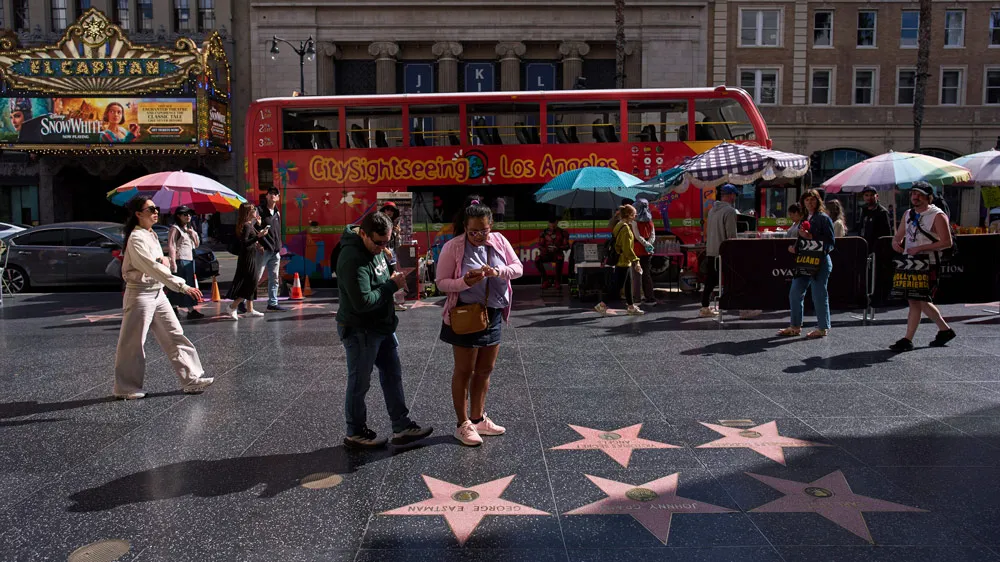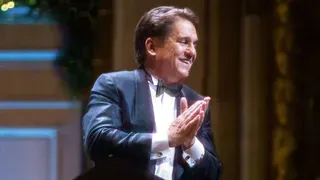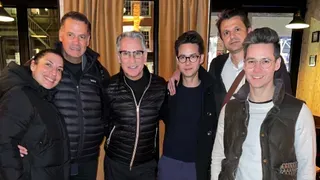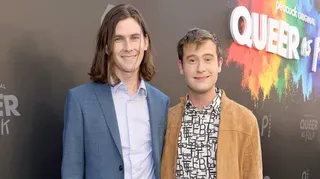June 14, 2022
Out Director João Pedro Rodrigues on his New Orgasmic Film 'Will-o'-the-Wisp'
C.J. Prince READ TIME: 10 MIN.
The year is 2069 in a version of Portugal where the monarchy never ended. King Alfredo lies on his deathbed in a sterile room with a José Conrado Roza painting looming over him. A child playing around him with a toy fire truck brings Alfredo back in time to the 2010s when he was a young prince, enamored with one of his country's great forests and worried about climate change. During dinner with his family, he directly addresses the camera to read Greta Thunberg's famous U.N. Climate Action Summit speech. One year later he announces his intention to become a volunteer firefighter so he can protect the forests.
That's just the prologue of João Pedro Rodrigues' "Will-o'-the-Wisp," a 67-minute self-described musical fantasy that finds the Portuguese filmmaker hopping from one idea to another at a rapid pace. Light on its feet but far from shallow, the film addresses themes of class, race, sex, politics, the environment, and more as he follows the young Alfredo's training at a fire station.
For those familiar with Rodrigues' earlier films like "O Fantasma" and "The Ornithologist," it shouldn't be surprising to see him seize on the homoeroticism of the setting; a training montage has the camera fixated on the firemen's thighs, and a sequence of firefighters posing for their calendar as "classic paintings" (most of which are made up) provide an opportunity to put naked men in a variety of suggestive positions. This all leads to romance for Alfredo, who falls in love with his Black colleague Afonso. The wide gulf between them, defined by their differences in social status, privilege, and skin color, is something they're well aware of, and the impossibility of their love is exactly what draws them closer to each other.
Rodrigues centers his film around Alfredo's flirtations with independence and desire, which allows him to direct with a level of freedom that reflects the idealistic, "anything's possible" attitude that comes with starting out as a young adult. Even over such a short runtime, it's impossible to guess what might unfold from one minute to the next, whether it's a joyous dance sequence, a children's choir singing a kids song from the 80s, or an explicit 69 sequence in the charred remains of a forest fire (which ended in two facials that had the audience burst into applause mid-film during its screening at this year's Cannes Film Festival). "Will-o'-the-Wisp" may be a fleeting experience by design, but Rodrigues doesn't waste a single moment, making what might be his most joyous and entertaining film to date without compromising on the eroticism, queerness, and wild imagination seen throughout his filmography.
After its premiere at the Directors' Fortnight in Cannes, EDGE sat down with João Pedro Rodrigues in a roundtable interview to discuss "Will-o'-the-Wisp," how he prepared to direct musical sequences, and the "explosive" reaction at the film's first screening.
EDGE: Your film has a very unique structure and style. There is a playfulness between genres, and the film evolves a lot.
João Pedro Rodrigues: It starts as science fiction, and then it becomes a comedy, and then it becomes a musical. I think it keeps evolving. But also, in the beginning, there's this formality. There's a theatrical element because there are doors that open and close like theater curtains. I think the film is also a lot about, how do you represent yourself? And how do you finally discover who you really are? And perhaps that's the reason for [the film's] evolution.
Q: How did you decide on how much space and time that this story needed, and why make it last for such a short time?
João Pedro Rodrigues: I'm tired of very long films. [laughs] It's a little bit like an explosion, because I think in the film, each scene is different from the previous one. I also like films that surprise me. I want it to be a continuous surprise, sort of like an orgasm, and then it goes away. But I hope it gives people something to keep in their memories.
Q: How did you approach the filming style and cinematography?
João Pedro Rodrigues: I always worked with the same cinematographer [Rui Pocas] from the start, so he was very easy to work with. With this [film] we had specific references of paintings and painters, and we had nonexistent paintings. We spent a lot of time inventing fake paintings by real painters, like a pastiche. It was a film that was really fun to make and I think everybody had a lot of fun [shooting it]. We had a very low budget and I made it fast. We just had two weeks and two days of shooting, which is short for a feature. It was very fast for me but it was so pleasurable to make, and I think you can see that in the film. I was looking forward to the premiere, and I think the reaction was explosive.
EDGE: I want to ask specifically about the Jose Conrado Roza painting that's so prominent in the film. Why did you want to feature it in the film?
João Pedro Rodrigues: That painting is now in a museum in France, but it's from a Portuguese painter from the 18th century. It depicts the "zoo" of one of our queens, but at the same time it sounds weird to say "zoo" [since] those people were not in cages. It was like in Velazquez's paintings of the small people that were companions to the little princess. [Roza's] painting was originally called "The Marriage of Negro Rosa." When it was bought by the French museum, they changed the title to "The Nuptial Masquerade" because you cannot say "Negro Rosa" anymore. But I think that also talks a lot about the irony in this film, because the Prince's mother tells her husband that he cannot say that name anymore. I think the irony of the film is also the irony of that title, how we can and cannot name things. That's why I chose that painting.
Q: You've already said the initial film was a comedy but the musical aspect is quite prominent as well. Could you tell us a little bit about what influences your choices when it comes to choreography and sound?
João Pedro Rodrigues: When I worked with the choreographer, we watched a lot of Vincente Minelli, Stanley Donen, and a lot of Fred Astaire. But also contemporary music videos from Perfume Genius, or the Paul Thomas Anderson film "Anima" that he did with Thom Yorke. We watched a lot of different stuff. For the origin of the choreography, it's because before the [dance sequence], they are doing this exercise with the [first aid] position. The origin of the choreography is from those gestures, and so we departed from them. And then we developed the duo first, and then an ensemble of dancers. There are very different origins, and also very different music in the film.
Q: This is more like a tableau film compared to many of your earlier ones. Do you feel that your style has become more contemporary, almost like a Manoel de Oliveira style?
João Pedro Rodrigues: Oliveira is definitely a reference for me. It depends. Composition is something that I worry about. I think I learned about telling stories not only by watching films, but also by looking at paintings. For me, it's essential to be precise when you're framing [a shot] so I think it's something that is natural in me and my work with the cinematographer. I know very well what I want to do and how I want to film a scene whenever I start filming, so everything is well prepared. I think it's natural [for me]. I like films where you can see the director worries about composition.
EDGE: Your film is a comedy, but it contains heavy themes like climate change, COVID, and colonialism. Do you find there's something unique to comedy when it comes to handling that type of subject matter?
João Pedro Rodrigues: You get to talk about those subjects in an apparently light way. What I like about comedy, and specifically this film, is that I can tackle these serious and important subjects but with a lightness that I don't think would be possible if it was a drama.
Q: Actors are so often asked about what it's like to do sex scenes, but I've never really spoken to a director about it. Are sex scenes anything different for you? Are they more delicate? Do they need a different approach than any other scene?
João Pedro Rodrigues: For me, it's the same in the sense that I film them as any other thing, but this is not really true, because when there's a sex scene there aren't many people on set. Of course it's a special moment but I try to film it as if it was a conversation.
Q: What do you think of this idea that, especially in American cinema, they use intimacy coordinators for those scenes?
João Pedro Rodrigues: I didn't even know that existed.
Q: There are people who come in and work for the director so nothing happens. It's a new profession.
João Pedro Rodrigues: So it's the replacement of, you know, those people that in porn...
EDGE: The fluffers?
João Pedro Rodrigues: The fluffers! [laughs]
Q: Big difference!
EDGE: There's a difference in how you portray generations in the film. The parents' portrayal skewers the rich, while the prince is very sincere in his intentions along with his relationship with Alfonso. Do you have anything to say about the younger generation?
João Pedro Rodrigues: That I think the younger generation is the future? No, they will grow up and become the older generation. I think the prince is also someone that is young and he's discovering something. You really watch his sexual awakening. He comes from a very formal background and very formal education, and he discovers freedom in the firemans' environment.
EDGE: So why did you choose the firemen's world, especially as a contrast to the world of royalty?
João Pedro Rodrigues: First, there's a real story from the Portuguese monarchy. We haven't had a monarchy since 1910, but there was a tradition of members from the aristocracy being firemen. I changed it a little bit, but it's sort of a real story. And I heard that the prince wanted to be a fireman, from the descendants that still exist. Of course, there's no royal family or royal aristocracy today but there are descendants, so I wanted to play with that. And then the firemen are also a sort of symbol of gay eroticism, so I played with that iconography.
EDGE: What was the most difficult part of making the musical sequences?
João Pedro Rodrigues: The main choreography, but we had rehearsed a lot before. We started rehearsing this film in 2020. I shot it in November 2021, so we had a lot of time to rehearse and it was very enjoyable. Everybody was really involved, and it was such a joyful experience.
Q: Do you have another film coming up?
João Pedro Rodrigues: I just finished another film. Because of COVID, I had two films and they both got delayed. It's sort of a portrait of Lisbon based on a founding film of the Portuguese New Cinema, which is the equivalent to the New Wave in France, from 1963. It was shot in the neighborhood where I live in Lisbon and the director was my teacher at film school. It's a fictional film, but it's sort of a portrait of Lisbon nowadays. That one was really affected by COVID in the sense that it's something that is in the film. We started shooting in 2019 and then we kept shooting and interrupting because of COVID. It's sort of like a haunted film.
Q: What do you expect the reception for this film to be in Portugal? Will it offend people?
João Pedro Rodrigues: I hope people laugh as much as they did here [laughs]. I was hoping that people would laugh but not like what happened the night of the premiere.
EDGE: I was at the premiere. Everyone applauded after the facials.
João Pedro Rodrigues: I was so surprised. I had never seen that in a [screening] where people applaud in the middle. It's like going to the opera and applauding in the middle of the arias. I thought wow, this is really cool, people are really getting into the film.
EDGE: You end your film with the prince's funeral, but at the same time it's a sort of hopeful ending because João also reemerges as the president.
João Pedro Rodrigues: He's the president of Portugal and he's Muslim! [Laughs]
Q: Why did you decide on those specific years that you set the film's stories in?
João Pedro Rodrigues: 2069 is because of the 69. [Laughs] And also because of the Serge Gainsbourg song "69 année érotique." For me that was obvious, that when it's the future it had to be 69.
EDGE: Do you have a hopeful feeling for what's to come?
João Pedro Rodrigues: I wish! (Laughs) Don't we all wish that this world changes? Unfortunately, it's going a little bit in the other direction. We live in a very horrible moment nowadays with the war but I wish it changes soon.







